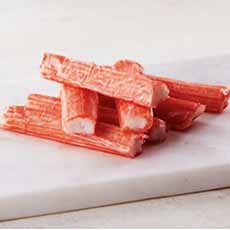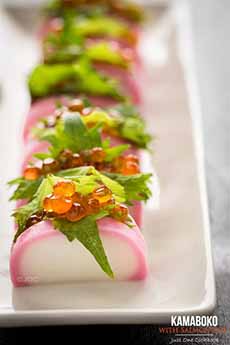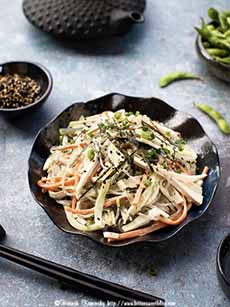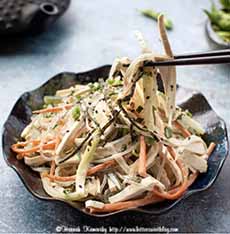|
If you’re a sushi fan, chances are good that you’ve had surimi, a paste made from fish and turned into products used in U.S. sushi bars where it is called kani (photo #1). It’s also used as an inexpensive substitute for crab in imitation crab salad and elsewhere. American brands are called crab stick, imitation crab, or sea leg. In addition to kani, surimi is also made into other forms that are popular in Japan. It is cousin of kamaboko, which also appears in Japanese restaurants and grocery stores, under the English name of fish cake (photo #3). Both kani and kamaboko are made from puréed white fish. The purée is then shaped and flavored differently. Kamaboko has its own holiday in Japan, National Kamaboko Day, celebrated on November 16th. But there’s is no holiday for kani or surimi (or even the California Roll), so we’re appropriating its cousin kamaboko’s holiday to give you a delicious “vegan kani” recipe. (Full disclosure: There is a National Crab Day, March 9th, but we could never use it to discuss fake crab.) Head here for a more general discussion of kamaboko. Here’s some insight from our colleague Hannah Kaminsky of Bittersweet Blog. She’s created the recipe for vegan kani salad below, using real tofu instead of imitation crab (you can, however, use crab, imitation or real, in the recipe). “It’s no secret,” says Hannah, that “crab” (a.k.a. “kani”) in your California roll at most sushi bars is anything but. [It’s also often sold in the prepared foods section of your grocer as “imitation crab salad.”] “Surimi has been the go-to crustacean imitation treasured by restaurateurs for its low cost, touted by nutritionists as being higher in protein than the real deal, and willingly accepted by sushi bar patrons. “While that may be true, let’s not forget what surimi really is: cheap, highly processed white fish (typically pollock) with added sugar, color, preservatives, and fillers. If you’re looking for a healthier or more ethical choice, that really doesn’t fit the bill. “You know what always gets high marks for nutrition, sustainability, and versatility? Tofu! “It’s ‘the other, other white meat’ that’s the chameleon of the plant-based protein world. Most people think of tofu as a meat substitute, but let’s not forget that it works just as well to curb seafood cravings of all sorts. “Super firm tofu is strong enough to withstand a fine julienne cut, reminiscent of the shredded, stringy texture of torn surimi. I’ve used it in the recipe below.” “Don’t be crabby about fake surimi salads,” says Hannah. “Make your own plant-based kani salad instead. This version is higher in protein and fiber, comes together in minutes, and is full of flavor.” Prep time is 15 minutes. Editor’s note: If you want to use kani for an imitation crab salad and regular mayonnaise instead of vegan mayo, go for it! 1. PLACE the cut cucumbers and carrots in a large bowl and toss with the salt. Set for about 10 minutes to soften. Meanwhile… 2. BREAK the glass noodles in half and place them in a heat-safe bowl. Pour boiling water on top to cover. Let stand until rehydrated; about 7 minutes. Drain thoroughly and rinse in cold water before adding to the bowl of vegetables. 3. ADD the tofu, half the nori, and half the scallions to the bowl and very gently toss to combine. 4. WHISK together in another bowl the mayo, vinegar, and soy sauce until smooth. Pour the dressing over the salad and fold carefully with a wide spatula to incorporate. 5. TRANSFER to a serving bowl and top with sesame seeds and the remaining nori and scallions. Serve right away, or cover and refrigerate for up to 24 hours. |
|
|
|
________________ *Super firm tofu is my top pick, since it’s ready to use right out of the package, no draining needed. If you can’t find this, extra firm is also great after pressing for 10 – 15 minutes. This helps remove a bit more of the water and create a more compact texture. My favorite brands are Hodo Organic Extra Firm Tofu, Nasoya High Protein Super Firm Tofu, and Wildwood Organic High Protein Tofu.”
|
||
Imitation Crab Salad Recipe Turned Vegan For National Kamaboko Day
← Older Post Newer Post →






